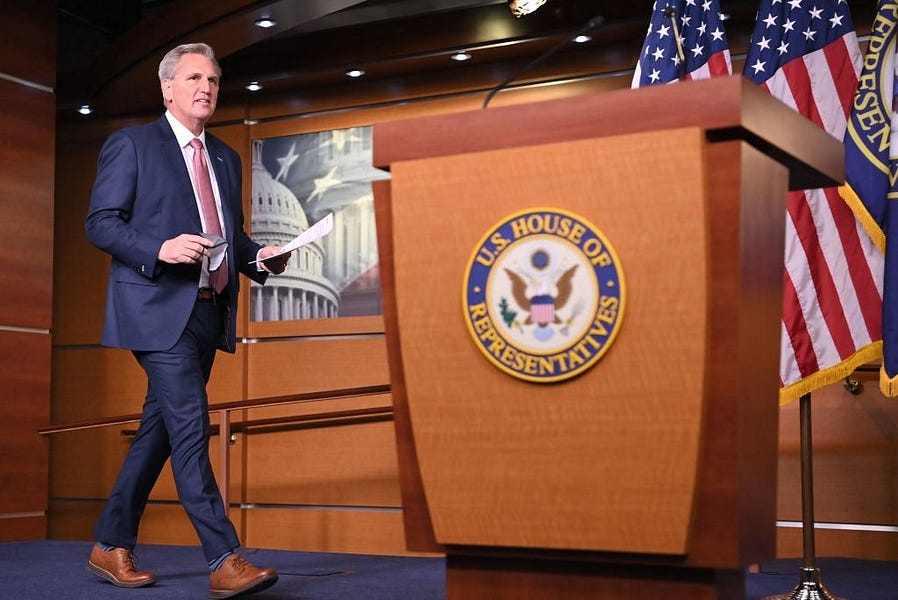In a private appearance in front of a small crowd at Mar-a-Lago in late April, former President Donald Trump pointed supporters to the phony recount taking place in Maricopa County, Arizona, and insisted once again that he won the 2020 presidential election.
“Let’s see what they find. I wouldn’t be surprised if they find thousands and thousands and thousands of votes, so we’re going to watch that very closely. After that, we’ll watch Pennsylvania and we’ll watch Georgia, and you’re gonna watch Michigan and Wisconsin, and you’re watching New Hampshire—they found a lot of votes up in New Hampshire just now, you saw that, because this was a rigged election,” he said. “Everybody knows it.”
The election wasn’t rigged, of course, and while Trump’s monomaniacal insistence that it was has convinced a majority of Republican voters, most congressional Republicans understand that Joe Biden is the rightfully elected president.
One person who knows this well is Kevin McCarthy. He’s said so, repeatedly.
Dave Wasserman is an editor at the nonpartisan Cook Political Report and an election analyst with NBC News. He’s highly respected by both Republicans and Democrats. Don’t believe him? How about McCarthy himself?
In a January 11 interview with his hometown paper, the Bakersfield Californian, McCarthy boasted about his efforts to convince Trump he’d lost and to urge him to concede to Biden. “Stop this!” McCarthy says he told Trump, imploring him to acknowledge the reality of his loss and move on.
Trump hasn’t moved on. He gives impromptu speeches at Mar-a-Lago swearing the election was rigged. He subjects visitors to long, disjointed stemwinders about the election victory he’s been denied. And, on Monday, Trump released yet another statement insisting that he was robbed. “The Fraudulent Presidential Election of 2020 will be, from this day forth, known as THE BIG LIE!”
This was too much for Rep. Liz Cheney, the third-ranking Republican in the House.
It’s a simple statement of fact, but for Kevin McCarthy it was the proverbial last straw. McCarthy allies leaked to anyone who would listen that Cheney was finished as a Republican leader. On Tuesday morning he told Fox & Friends’ Steve Doocy his GOP colleagues were worried. “I have heard from members concerned about her ability to carry out the job as conference chair, to carry out the message.” In off-air comments before his Fox hit leaked to Axios, McCarthy went further. “I’ve had it with her. You know, I’ve lost confidence,” he said.
Careful observers will have noticed something peculiar in this chain of events: McCarthy is moving to push Cheney out of her leadership position for saying in May what he’d said repeatedly himself months before. McCarthy knows that Trump is lying about the election. He knows that Cheney is telling the truth. And he’s choosing Trump anyway.
A politician with a modicum of moral sensibility might be embarrassed by the embrace of such an obvious falsehood. Kevin McCarthy is not such a politician. Two weeks after declaring on the House floor that Donald Trump “bears responsibility for Wednesday’s attack on Congress by mob rioters,” McCarthy traveled to Mar-a-Lago to enlist Trump’s help in achieving his career-long objective of becoming speaker of the House.
These kinds of compromises have become commonplace over the last five years. They don’t jump out at us the way they used to, the way they ought to. But there’s something rather extraordinary about it all. McCarthy is on the record saying that Trump is lying about the election results and that he blames Trump for instigating the insurrection on January 6. But he believes that the path to the speakership runs through Mar-a-Lago. And if that means hugging the guy lying about the election, the guy who fomented an insurrection, so be it.
There are other inconsistencies here. After Cheney voted to impeach Trump, the House GOP conference held a no-confidence vote on her position as the number three leader among House Republicans. Cheney easily prevailed, 145-61, and McCarthy spoke on her behalf, arguing that the GOP was big enough, and mature enough, to welcome different views. “This Republican Party is a very big tent,” he said. “Everyone is invited in.”
Not anymore. McCarthy talks regularly with Trump, who has made no secret of his desire to see Cheney ousted. And Trump priorities become McCarthy priorities. (This is, after all, the guy who once separated Trump’s favorite Starburst flavors from the undesirables.)
But these priorities are revealing. McCarthy is one of the top Republicans in Washington. His time is valuable, and how he chooses to spend it says a lot about how he views his job and, for better and worse, the modern Republican party. McCarthy sits atop a fractious caucus with its fair share of freaks. Rep. Marjorie Taylor Greene is an ardent conspiracy theorist and an ugly racist. Rep. Matt Gaetz is credibly accused of paying for sex with a minor. Rep. Paul Gosar attended a conference hosted by a white nationalist who’s toyed with Holocaust denial. And on it goes.
To the extent McCarthy has spent any time on these problems, it’s been to downplay or dismiss them. But Cheney’s political apostasy has earned his full attention. At the House GOP retreat in Orlando last week, McCarthy called yet again for unity and went out of his way to suggest that Cheney’s criticism of Trump was a distraction. His allies have been trashing her anonymously ever since, setting up the coming vote on her ouster.
The takeaway is unmistakable: Consort with white nationalists, hook up with teens, peddle QAnon craziness, and you’re okay; but condemn Donald Trump’s election lies and you’re a target.
What kind of leader prioritizes the baseless ravings of a political loser over the leadership of a truth-teller who has the temerity to object when the serial liar lies?
Kevin McCarthy is that kind of leader. He may get the kind of unity he wants—the kind of unity his master in Mar-a-Lago demands. And he may well become speaker of the house. A party so unified will have the leader it deserves, but it won’t deserve power and probably won’t have it for long.







Please note that we at The Dispatch hold ourselves, our work, and our commenters to a higher standard than other places on the internet. We welcome comments that foster genuine debate or discussion—including comments critical of us or our work—but responses that include ad hominem attacks on fellow Dispatch members or are intended to stoke fear and anger may be moderated.
With your membership, you only have the ability to comment on The Morning Dispatch articles. Consider upgrading to join the conversation everywhere.